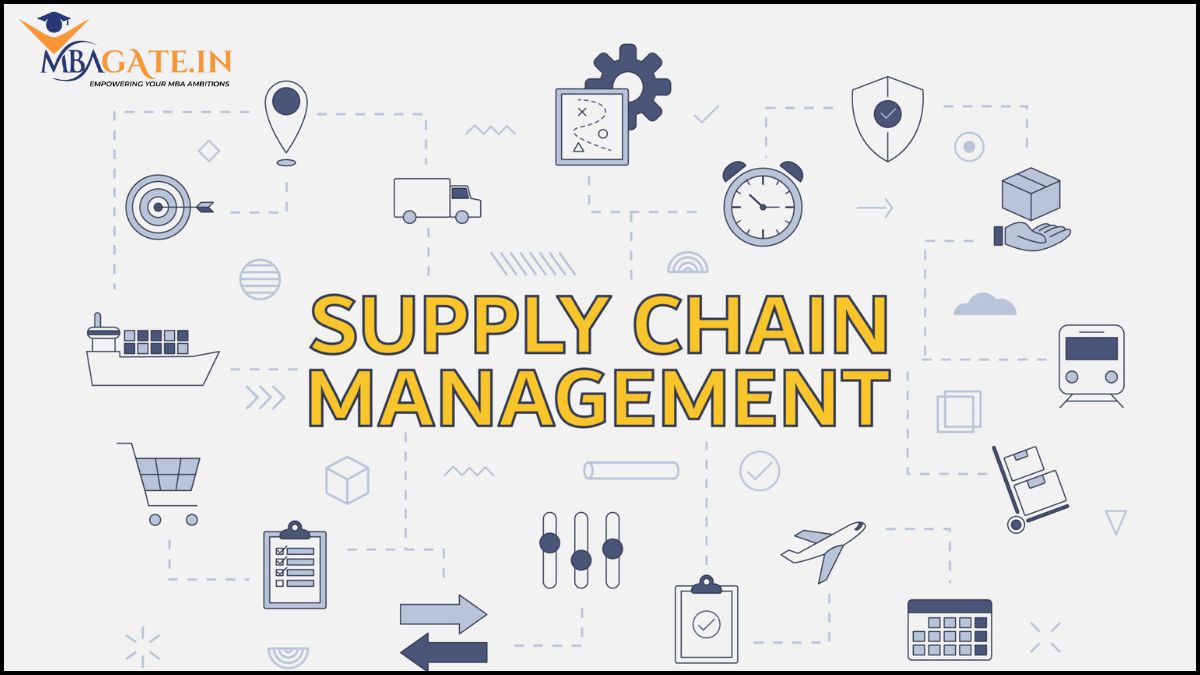MBA in Supply Chain Management
Table of Content
-
- + more items Show less
In the current global economy, companies count on smooth supply chains in order to compete. This course will educate students on how to save costs, improve efficiency and keep customers satisfied. It synthesises basic business knowledge with specialisation subjects like logistics and supply chain operations.
The syllabus mostly features subjects like supply chain analysis, logistics management, operations management, procurement, inventory control, transportation management and global supply chain strategy. The students also study new technology, including ERP systems, blockchain supply networks and e-commerce logistics.
Other than instruction in class, a number of institutions offer real-world exposure through internships, case studies, and live projects. These expose students to the practical workings of supply chains in sectors like manufacturing, retail, e-commerce and transportation.
Eligibility for an MBA in Supply Chain Management normally consists of a graduate degree from a recognised university. Some colleges also mandate candidates to clear entrance tests like the CAT, MAT, XAT or GMAT and then group discussions or personal interviews.
With completion of this MBA, students can be employed in diversified industries like retail, manufacturing, logistics companies, e-commerce, FMCG and pharma.
The average salary for freshers in this industry is between 4 to 8 lakhs per year, depending on the college, type of job and industry. With experience in this field, one can move up to higher ranks and draw good salaries.
This career is ideal for students who enjoy planning, problem-solving and process management. Supply chain managers are needed in nearly every industry, so it is a good revenue-generating career. With increasing global trade and online shopping the market for professional supply chain managers will grow.

Highlights
The program can be clearly understood from the table below. It provides details on the requirements, admissions procedure, typical costs and package, along with the recruiters for an MBA in Supply Chain Management. The following list also includes the most popular job positions. For appropriate direction, students who wish to participate in the program might consult the information.
What is an MBA in Supply Chain Management?
MBA supply chain management students are more apt at handling the movement of goods and services through international networks. The purpose of the speciality programme is to enhance supply chain processes, save costs and maximise operations. With the increasing importance of technology and sustainability, students are exploring how supply chain activities could be optimised through digital resources like artificial intelligence, blockchain and data analytics. Alumni of this program are poised to assume leadership roles in industries that require supply chain management to succeed, including manufacturing, retail, healthcare and technology. The MBA enhances critical thinking, problem-solving, and strategic planning competencies, enabling professionals to adjust to changes in the market, manage risks and fuel innovation. It gives one a firm foundation to enhance business operations and add value to organisational success.
Eligibility criteria
The following are the admission requirements for an MBA with specialisation in supply chain management:
Candidates who secure a minimum of 50% (45% for SC/ST) in the qualifying exam. Those students who wish to secure admission before appearing for their final year exams may submit a provisional degree along with the necessary documents.
A similar experience will enable students to obtain the required knowledge in the course, but it is not necessary. Experience is needed for the study of management, but Indian universities have not introduced it for the MBA degree, which lasts two years or so. It can also enable individuals to enhance their talents in preparation for upcoming opportunities.
Entrance Exam
Applicants for an MBA in Supply Chain Management usually have to clear national or university-level entrance examinations. Exams such as the CAT, XAT, MAT, CMAT, NMAT and GMAT are accepted by all business schools. These tests evaluate a candidate's capability for numeric skills, language ability, logical reasoning and data interpretation. All major institutes, such as IIMs, XLRI, NMIMS and Symbiosis, consider CAT, XAT and GMAT scores. Apart from these, various colleges conduct their own entrance tests, like SNAP (for Symbiosis), TANCET (Tamil Nadu) or MAH MBA CET (Maharashtra). During the final selection process, candidates who have cleared the written test will be asked to undergo group discussions (GD), personal interviews (PI) or writing ability tests (WAT). A good entrance exam performance, along with excellent communication and problem-solving skills, increases the prospects of joining respected universities. Preparation in advance along with practice of mock tests is the key to performing well in these exams and securing admission in a good MBA Supply Chain Management program.
Admission Process
The steps that the admission process for an MBA in Supply Chain Management includes are as follows:-
A bachelor's degree from an accredited university, in any field is required of the applicant. The minimum mark required differs in colleges (commonly 50% for general and 45% for reserved categories).
Appear for national-level examinations such as CAT, XAT, MAT, CMAT, NMAT or GMAT and also university-specific exams such as SNAP, TANCET or MAH MBA CET.
Apply for MBA Supply Chain Management courses at universities and colleges. Provide your entrance exam scores, academic transcripts and other supporting documents.
The candidates are shortlisted for the next round on the basis of their entrance examination scores, educational qualifications, and other selection criteria.
A written ability test, a personal interview or a group discussion are required of the shortlisted applicants.
Institutes prepare a final merit list considering performance in the admission test, GD-PI-WAT, academic marks, and work experience (if applicable).
Selected candidates receive offers of admission. They need to pay the admission fee to secure their seat.
Students complete admissions and start their course of the MBA course in Supply Chain Management.
Distance MBA in Supply Chain
This online degree program has the same requirements as the traditional program. By pursuing an online MBA degree in supply chain management, professionals can advance their careers while juggling work and family responsibilities.
Students who take this online or blended MBA program have access to everything in the course, from lectures to assignments, whenever they please.
It is focused on modern trends, such as emerging technologies such as blockchain and artificial intelligence, and applications in real life. It is taught through courses such as supply chain optimisation, logistics, procurement, and operations management. Further, distance learning encourages international networking through allowing students to engage with other classmates and industry experts from all around the world. This program is suitable for individuals who seek to acquire supply chain strategies and possess further leadership experience without having to relocate or shift their existing work responsibilities. Graduates of this program are prepared to propel corporate efficiency and steer the supply chain in almost any business.
Job Prospects for Graduates in Supply Chain Management
The most frequently employed job profiles include supply chain manager, operations manager, logistics manager and others. These are a few of the job descriptions for supply chain management graduates.
Subjects in MBA in Supply Chain Management
The course is designed by seasoned academics and professionals in the field. The teaching approach is intended to introduce students to the required software and the most recent techniques employed in the field. Through expert conversations, students can interact with senior management representatives from the sector and stay current on the most recent advancements. A list of some of the topics covered by this program is as follows:
Colleges with specialisations in PGP/MBA Supply Chain Management
The colleges listed below are the best for an MBA with specialisation in supply chain management. IIMs such as IIM Jammu, which charge ₹20.73 lakhs and offer an average annual package of ₹15.48 lakhs, are examples of government colleges. Private institutions include Symbiosis Institute of Business Management in Pune, which charges ₹27.70 Lakhs and provides an average package of ₹25.00 Lakhs annually, and Indian School of Business in Hyderabad, which charges ₹45.12 Lakhs and gives an average package of ₹32.05 Lakhs annually. A PGP or an MBA in supply chain management is offered by these universities. Additionally, it illustrates the average packages and fees for each college.
Colleges for specialised MBA in Supply Chain Management
The Colleges listed below are among the best private and public Institutes offering a specialised two-year MBA program in supply chain management. The program's curriculum mostly focuses on quality control, logistics, transportation and product supply chains. IIM Mumbai is the top government college for this program among the IIMs. The cost is ₹14.00 lakhs. At ₹15.30 lakhs, XLRI (Xavier Labour Relations Institute) in Jamshedpur is one of the best private colleges.
List of colleges in Supply Chain Management - other programs
Colleges that provide supply chain management degrees outside of MBA and specialised MBA programs are listed in the table. According to the NIRF, it displays the top public and private universities offering these degrees. The table also includes their fees and the length of the program. Public universities like IIT Delhi and IIM Ahmedabad are included. Depending on the course, the curriculum might last anywhere from 24 weeks to 7 years.
Supply Chain Management Future Scope
This management training offers opportunities in import and export businesses, international logistics, and warehouses. The Indian logistics sector is projected to earn USD 200 billion by the year 2025. India has been ranked 13th in foreign exchange logistics implementation, as per a report by the World Bank. From a recent study, this industry has more than 45 million employees and is growing by a 15% annual rate, with its subparts growing by 40%. This will create hundreds of new job slots in supply chain management. A supply chain MBA has a bright future because of such global trends as heightened globalisation, technological advancements, and the need for more effective logistics. As companies mature overseas, the need for individuals who can handle sophisticated, cross-border supply chains increases. Artificial intelligence, automation, blockchain and data analytics are changing supply chain operations. Consequently, specialists who can leverage these technologies to enhance decision-making and speed up processes are in high demand.
In addition, sustainability is emerging as a major corporate concern, offering supply chain professionals the chance to set the standard for ethical and environmentally sustainable practice. Career paths span from executive roles in global corporations to consultancy and entrepreneurship.
Conclusion
Those students seeking a career in logistics, operations and strategic planning can do themselves a big favour by pursuing an MBA in supply chain management. It equips graduates with the skills necessary to handle complex supply networks, reduce costs and drive corporate efficiency. With rising global trade and e-commerce, the need for supply chain professionals is expanding across industries. The program offers top-notch career opportunities in manufacturing, retail, logistics and FMCG industries.
Students are made ready for the corporate world by synchronising theoretical knowledge with practice. This MBA specialisation overall opens up fulfilling career opportunities with good remuneration and long-term development prospects in the corporate sector.
FAQs
Supply chain management means getting products to customers from scratch. This involves external processes like coordinating with manufacturers, suppliers and distributors. This involves understanding suppliers and has a broader scope than operations management. Operations management, in layman’s terms, includes internal processes like inventory, manufacturing and optimizing internal resources. Logistics however involves managing the movement and transportation of products, efficiently and cost-effectively.
The following fields include a variety of employment profiles:- 1. Oversight of suppliers 2. Management of warehouses (CFAs and distribution), 3. Management of manufacturing and 4. Management of logistics and distribution.
The two-year MBA program in logistics and supply chain management equips students with the analytical abilities and management techniques required for the transportation of goods and services through the use of warehouses, storage facilities, inventory, and customer service.









